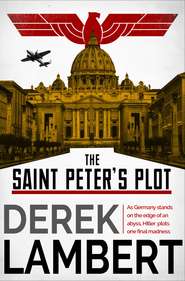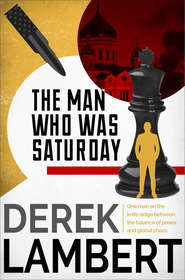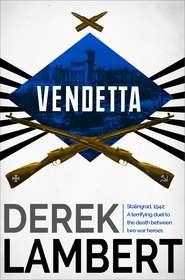По всем вопросам обращайтесь на: info@litportal.ru
(©) 2003-2024.
✖
The Yermakov Transfer
Автор
Год написания книги
2018
Настройки чтения
Размер шрифта
Высота строк
Поля
Before they left Leningrad he found, hidden in a bookshop opposite the Gostiny Dvor, a slim booklet printed by the old Yiddish publishers, Der Emes, containing the Hebrew alphabet. He kept it locked in his desk; later he obtained a Hebrew textbook.
But it was a period of frustration. There were now twelve members of his group of revolutionaries calling themselves the Zealots. But, short of planting bombs and reviving the rabid-Semitism of the Black Years, they found nothing positive to do. Pavlov raged inwardly. Caution, caution! His marriage suffered and Anna, not understanding, not knowing that he was a Jew, found consolation in her work taking her to the jewelled wastes of Siberia.
It wasn’t until 1967 when, in six days, the Israelis routed the Arabs, and the desire to settle in the Promised Land flamed across the Soviet Union, that the ultimate plan began to take shape in the minds of Viktor Pavlov and the Zealots.
* * *
The Jews were on the rampage bombarding authority with appeals. The Presidium of the U.S.S.R. Supreme Soviet, the Secretary-General of the United Nations, the International Red Cross, the Knesset, the Commission on Human Rights, UNO, premiers, editors, enemies, friends.
Viktor Pavlov who had studied the fluctuating history of Zionism in Russia regarded their efforts with good-natured cynicism.
The movement pre-dated world Zionism. In 1884, fourteen Jews from Kharkov landed in Jaffa and, even before World War I, most of the forty settlements in Palestine were founded by Russian Jewry.
When the Bolsheviks came to power in October, 1917, the movement seethed with excitement. But, as always, the excitement was short-lived. On September 1, 1919, the Cheka occupied the offices of the Zionist Central Committee in Leningrad, confiscated all documents and 120,000 roubles, arrested Committee members and banned the Chronicle of Jewish Life. Next day Zionist leaders were arrested in Moscow.
The harassment subsequently took a zig-zag course. Imprisoned Jews were released; others were arrested; seventy-five delegates to a convention in Moscow were accused of counter-revolutionary activities – peroxylin slabs of guncotton were said to have been found in the Zionist Central Committee offices – and thrown into Butirki jail.
In 1921 the pressure eased. In 1922 it stiffened again. Fifty-one members of the popular wing of the Zionists were arrested and accused of seeking help from reactionary elements ranging from Lloyd-George to the Pope.
Arrests continued on a vast scale. The Russians wanted to get rid of a few expendable trouble-makers and, in return for statements that their activities were anti-Soviet, some were allowed to go to Palestine.
By 1928 thousands of Jews were in prisons and camps. They were beaten, tortured, starved, thrown into solitary confinement. By 1929 all the Hechalutz collective farms preparing Jews for conditions in Palestine had been liquidated. Between 1925–26, 21,157 Jews managed to get out of Russia: between 1931–36, only 1,848 made it to Palestine.
In 1934 the last outpost of underground Zionism, the Moscow Central Executive Committee of Tzeirei Zion and the Union of Zionist Youth, was destroyed. Its members were jailed and the Government presumed Zionism dead.
It was reincarnated at the beginning of World War II when the Soviet Union annexed tracts of Eastern Europe, increasing its population by two million Jews, predominantly Zionist. Hundreds of thousands of them were promptly sent to forced labour camps.
In June, 1941, the Germans invaded Russia, slaughtering any Jews they encountered, and, years later, the Russians built a playground over the site of one of their massacres at Babi Yar.
Then came the formation of JAC. Hope followed inevitably by disillusion.
After the war Stalin supported the creation of the State of Israel because he thought it heralded the break-up of British power in the Middle East; Russia was one of the first powers to recognise the new country in 1948. But, after Stalin’s death in 1953, the policy changed: the Americans held the influence in Israel and the Soviet Union decided to undermine Western power by supporting the Arabs.
Inside Russia, Krushchev turned on the dead dictator Stalin, denouncing his butchery. Viktor Pavlov remembered the impact of the Khrushchev speech in his schoolroom. He also remembered that it made no mention of Stalin’s persecution of the Jews.
During Krushchev’s reign the terror inside the Soviet Union relaxed. When he was deposed and Leonid Brezhnev and Alexei Kosygin finally came to power, Premier Kosygin announced in Paris on December 3, 1966, that “as far as the reunification of families is concerned, if some families wish to meet or if they want to leave the Soviet Union, the road is open to them and there is no problem in this.…” On December 5 his statement was published in Izvestia.
It launched a flood of applications for exit visas to the OVIR.
Between June 5–11, 1967, Israel smashed the Russian-equipped armies of Egypt, Syria and Jordan and on June 10 the Soviet Union broke diplomatic relations with Israel; the Soviet attitude to Jewish emigration hardened once more.
On August 5 Viktor Pavlov chanced upon a copy of Sovietskaya Latvia in which Zionism was likened to the Mafia. He liked the comparison.
* * *
The plot assembled in several phases. In 1967 it was merely concerned with getting the Jews out of Russia. At a party in 1969, one year before the Leningrad skyjack trial, it assumed a more definite shape.
The party was at Pavlov’s Moscow apartment on Kutuzovsky in the complex of blocks where foreign diplomats and journalists lived, guarded at the gates by militiamen and bugged by the K.G.B. Many residents regarded the hidden microphones as a joke; about two committed suicide every year. The Pavlov’s got the apartment because the complex was one of the best in town and it was salutory for foreigners to see the pride of Soviet man and womanhood crossing the shabby courtyard.
The Pavlovs’ guests that evening included scientists, mathematicians, geologists, Yevtushenko the poet, a ballerina from the Bolshoi and some of the staff of the prestige magazine Novy Mir.
Pavlov was talking to Professor David Gopnik, associate member, Ukranian Academy of Sciences, department chief, Donetsk Computing Centre. They talked in symbols and electrical pulses, boring other guests so that finally they were isolated in a corner of the lounge.
Gopnik, a thin, bespectacled man with a low forehead contradicting popular beliefs about intelligence, said casually: “I tried to get out again today.”
Pavlov looked at him with surprise. “Get out of where?”
Gopnik looked equally surprised. “Out of Russia, of course. They turned me down again.”
“I didn’t realise you were a Jew.”
Gopnik grinned. “Feed me back through a computer and you’d end up with Moses.” He glanced around the other guests, voluble with Soviet champagne and Stolichnya vodka bought at the dollar shop on the first floor of the block. “And I’m not the only one here. A few of your guests are the product of mixed marriages. One or two have changed their names. Comrade Goldstein doesn’t get very far in Soviet society.”
“You’ve done all right,” Pavlov commented.
“Only because they need my brains.” Gopnik took a sliver of toast smeared with caviar and a glass of champagne from a tray carried by Pavlov’s hired waitress. “My brains are my misfortune. Without them I might be in Jerusalem today.” He stared at Pavlov knowingly. “Is there, by any chance, any Jewish blood in you, Comrade Pavlov?”
Pavlov hadn’t been asked the direct question since his student days. To deny it was treachery, blasphemy; like betraying your mother to the secret police. To confirm it was sticking a knife in the cover he had prepared for seven years. The K.G.B. knew of the diluted Jewish strain through his father, nothing more. As far as they were concerned he had proved himself an exemplary Soviet citizen willing to rat on any Zionist.
Pavlov said: “Would you like to see my passport?”
Gopnik said: “That won’t be necessary.” He licked some black spawn from his fingers. “It was very brave of you to invite a Jew to such a distinguished gathering.” He signalled to the waitress to bring him more champagne. “But, of course, you and your wife are somewhat privileged. And, of course, you didn’t know I was a Jew.”
His voice was loud with alcohol; Pavlov glanced around the lounge, with its contemporary furniture, its glassware from Czechoslovakia, its new TV set, to see if anyone was listening. “Perhaps we could meet tomorrow?” he suggested.
“Why? So that you can tell me the truth without fear of being overheard?”
Which was precisely what Pavlov had in mind. “Just to have a chat,” he said, listening to his own duplicity.
“What is there to talk about?”
“Perhaps I can help you.”
“And perhaps you can put the K.G.B. on to me.”
Pavlov spoke quietly and intensely wanting to grip the man by his lapels. “The K.G.B. already know everything about you. They’ve interrogated you, haven’t they?”
Gopnik shrugged. “Perhaps you might like to tell them that I’ve been spreading seditious propaganda.”
“Listen,” Pavlov said. “Meet me tomorrow. I promise I’ll tell no one.”
“The promise,” Gopnik asked, “of a Russian or a Jew?”
“A promise,” Pavlov said.
Gopnik looked at him uncertainly, swaying slightly. “Where?”
Pavlov smiled at last. “Outside Lenin’s tomb. Where else?”
Другие электронные книги автора Derek Lambert
The Red Dove




 3.67
3.67
Vendetta




 0
0











